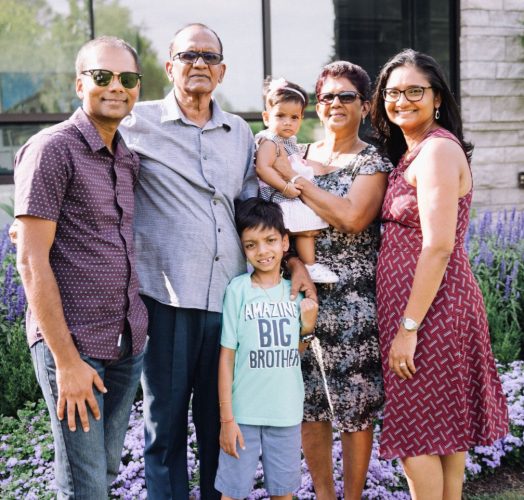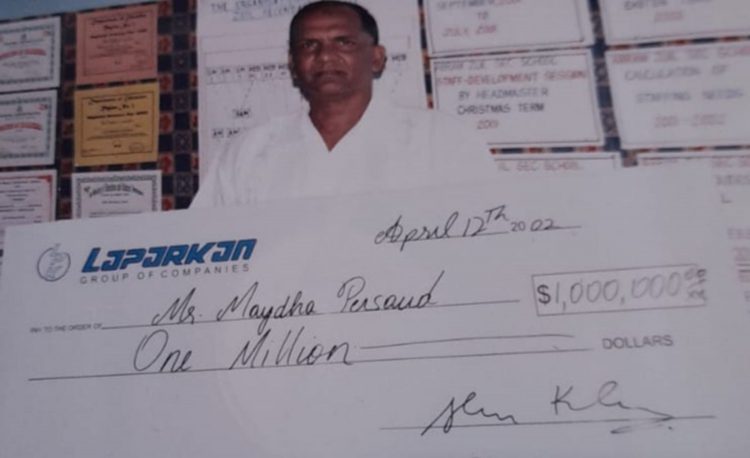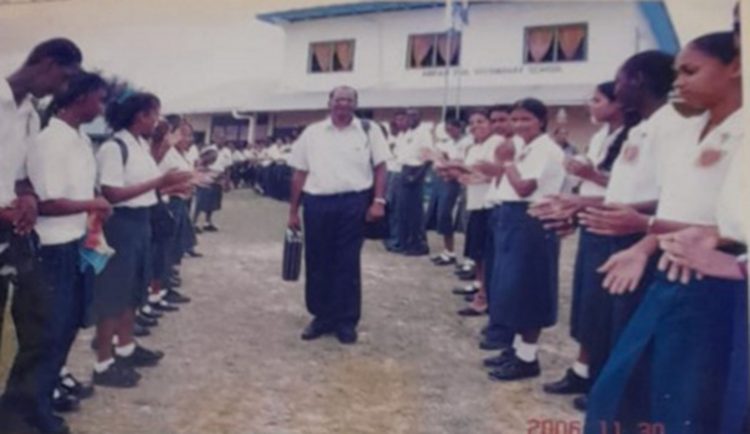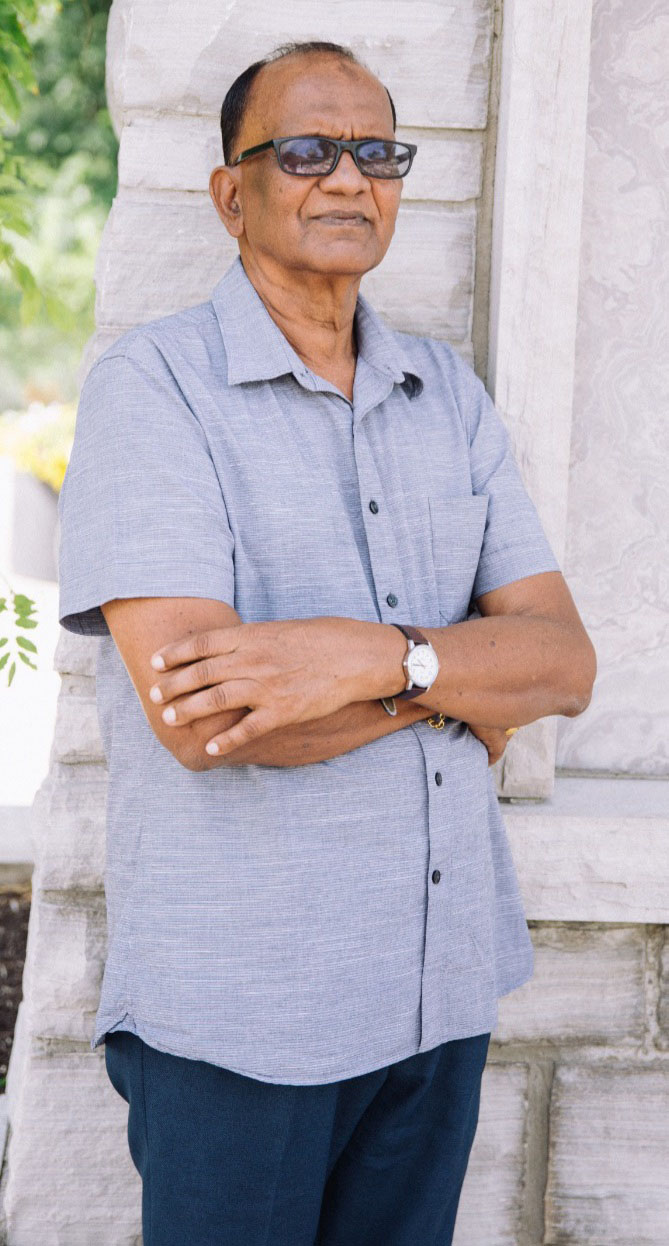Maydha Persaud, 69, retired headmaster and teacher of Abram Zuil Secondary School, is this year marking 50 years in the teaching profession, and now teaching mainly students seeking a second chance at the Caribbean Secondary Education Certificate (CSEC), even though he retired from the formal education system 14 years ago.
“Right now I am actively teaching students. I do mostly voluntary work which I enjoy. One or two will pay but the majority are poor and cannot afford to pay the high lesson fees offered for private tuition so they come to me for help. They are mainly children from the Pomeroon River, and the lakes, like Capoey, Mashabo and Tapakuma. I give them free accommodation and meals.”
In an interview with Stabroek Weekend, Persaud, who is a Justice of the Peace and Commissioner of Oaths to Affidavits since 2002 helps the underprivileged in instances when they cannot afford a lawyer. He is also a Hindu priest and a religious leader in his community.

His students are mainly private candidates who previously wrote the CSEC examinations and who failed English and Mathematics or either of the subjects in the formal secondary school system. As both subjects are necessary for employment purposes or to pursue higher education, they seek out Persaud’s help at a second chance in securing the subjects.
Because of the Covid-19 pandemic, Persaud said that he has had to put a hold on classes that would have allowed for children in grades 10 and 11 who are currently in the secondary school system. He has had very good results from his charges, who were given a second chance and are either working in good positions across the country, or, are now students at the University of Guyana or universities abroad pursuing further studies.

“My students remember me. If I go to their work place, they help me. When I am travelling, they won’t charge me. Even their parents would send me greens and vegetables. When they have religious functions, they invite me. They would help me if I have work to do as a show of their gratitude. I don’t ask for compensation.”
In the past, he taught Human Biology and Literature but at present he focusses only on Mathematics and English. Persaud was born on Golden Fleece estate, Essequibo Coast and is husband of Juliet, father of two children and grandfather of two. “My first 11 years I lived in a logie. There I learnt the value of kindness, honesty and hard work. I had 10 siblings. Because it was rice farming community, the more children a family had, the more help there was in the rice fields. Most families had more than eight children because children provided cheap labour, especially if they were boys. We hadn’t tractors and combines in those days. We did the work manually. I did my share of work in the rice fields but my father ensured that we were all educated.”

Persaud attended Fisher Primary School in Golden Fleece, where he started his teaching career in 1971 as an acting teacher. The following year, he wrote the teachers third class examinations and was the only teacher to pass the exams. “I was promoted from an acting teacher to a class two grade two teacher.”
He was encouraged to take on teaching as a career by the late Ramnarine Singh of Hampton Court, who was his headmaster of Fisher Primary and with whom he subsequently taught. “He motivated me to go into teaching. He always encouraged me to work hard and he used to help me a lot.”
From 1974 to 1976 he went to the then Government Teachers Training College (GTTC) where on completion he was named the best graduating mathematics teacher. At the GTTC, he said, “The course work was easy. I had 10 subjects at O’ Levels. However, I learnt a lot in education psychology but Mathematics and English were a walk through.”
On his return to Fisher Primary, he taught the then College of Preceptors and General Certificate of Examinations Ordinary Level classes at the form four level.
Journey at Abram Zuil
When Abram Zuil Junior Secondary School was established in 1982 to assist in easing the overcrowding at the Anna Regina Multilateral School (ARMS) in Cotton Field, Persaud was asked to teach mathematics. He said, “I didn’t want to leave Fisher Primary because I thought I had been doing a good job there.”
However, in 1983 he joined the staff at Abram Zuil Junior Secondary. “That began my journey at Abram Zuil. I started in 1983 as an assistant master and was promoted shortly after to senior master, deputy headmaster and then headmaster.
When Abram Zuil Junior Secondary opened its doors 115 children were enrolled in the first intake. “When I left in 2006 the enrollment was 845.”
Because of the hard work of students and teachers and their outstanding performance in academics and extracurricular activities, which students did simultaneously, Persaud said, the school was upgraded to Abram Zuil Secondary School (AZSS) and was no longer a junior secondary.
“Even though I was the headmaster and administrator of the school, I was in the classroom teaching. I prepared all the records as a classroom teacher. My presence in the classroom, I believe, motivated the teachers to work harder.”
Asked when he got the time to do the school’s administrative work, he said, “I stayed back in the afternoons to do administrative work and early in the mornings before classes start. I also worked on Saturdays and Sundays as I lived across the road from the school.”
In relation to extracurricular activities, students were encouraged to join the clubs that included drama, music, football, tour, religious and creative writing.
“We were strong in debating competitions and we used to win all or most of the debating competitions, especially the JOF Haynes Debating Competition. I would work with students on Saturdays and Sundays and other teachers would help.”
As a teacher he placed emphasis on discipline. “Discipline is the hallmark of learning. You have to know each child and get them to learn. You have to know where they come from. For many years my staff and I would make home visits to some students’ home to understand them better.”
In cases where children were staying away from school, he said, the visits revealed that some had no money to get to school and some parents had no interest in their children’s education.
“We spoke with parents to get them to understand the importance of education and we helped students to get to school. We also stressed regularity and punctuality for both teachers and students and they had to comply.”
Under Persaud’s guidance, the school encouraged peer teaching. “This involved children teaching children in which the faster learner helped the weaker ones, during their lunch break or even before classes started. That helped as some students may relate better to their peers.”
Because of the publicity given to good results and high discipline in academic and extracurricular activities, he said, some parents of students who were at ARMS sought transfers to Abram Zuil.
“The results were so good we were competing with all the top schools, like Queen’s College and Bishops’ High at CSEC. Some years our percentage passes were even better than Anna Regina Multi. At one time the Department of Education in Region Three asked me to go to ‘Multi’ but I couldn’t leave Abram Zuil.”
Persaud held regular staff development sessions and had “excellent support from Region Two Department of Education and the Ministry of Education and even external agencies would come in and help us.”
Summing up his sojourn as a teacher, he described it as, “Sowing seeds of knowledge in the heads of children and planting flowers of love in their hearts.”
His favourite quote in his teaching career is by French author and poet, Victor Hugo who said, “He who opens the school door, closes a prison gate,” and Persaud’s personal mantra is “Leisure can wait its turn. Human beings, my concern.”
Commenting on his students, he said, he cannot give recognition to anyone in particular. “They are doctors, lawyers and professionals of the highest caliber. They are doing a lot for society out there right now.”
Asked about challenges, he said, “My salary was small and it could have been a challenge but my love of teaching was greater than money.”
The old and the new
At one stage Abram Zuil Secondary became overcrowded and the school’s parent-teacher association (PTA) built one big troolie benab and two smaller ones without the help of government. Seven classrooms were held in the benabs. The PTA built the troolie roof structures in 1992/1993/1994 through fundraisers with most of the funds coming from the school’s canteen. At that time the school ran its own canteen.
“Every week we would make about $200,000. We started small, initially selling soft drinks and then expanded it to selling snacks at lunch time. When the ministry clamped down on the canteen activities we had to rent it out after which we were only getting the rent money.”
Under his tenure, the school’s PTA also built a concrete structure to accommodate its own home economic centre. The PTA furnished it with the necessary equipment. “We used canteen money and other fundraisers. We didn’t get anything from Government.”
Eventually with the decay of the troolie-palmed roofs and the introduction of the Secondary School Reform Project under the directorship of Dr Kenneth Hunte in 2003, the troolie roofs of the benabs were replaced by zinc sheets and proper rafters and ceilings. Walls erected to keep out the elements.
Due to the state of the school building deteriorating over the years, the greater part of it, which was a wooden structure, was demolished and government is in the process of building a state-of-the-art building to house the school. The children from Abram Zuil are attending classes at Aurora Secondary School on a shift system.
“I feel relieved to see a modern school building being erected. I am so happy that the school I struggled to build from nothing will be properly housed in something better. With God’s grace I’ll live to see the doors of that new building opened to better accommodate children of Abram Zuil Secondary.
Persaud was also coursed in curriculum design and writing. As part of his training he undertook a three-month course sponsored by the Indian Government’s International Economic Technical Cooperation programme in Chennai, India. He was recommended by the Ministry of Education.
In 2002 he was given the best teacher award and a million dollars that was donated by local shipping company, Laparkan. In recognition of his contribution to the education sector, he was awarded the medal of service in 2004. He retired from teaching in the public service at 55 years in 2006.
From 2007 to 2017 he worked as a part-time commissioner with the Teaching Service Commission, while still holding evening classes for his students.
As a commissioner, he was responsible mainly for recommending the appointment, promotion and disciplining of teachers in Regions Two (Pomeroon/Supenaam), Three (West Demerara/Essequibo Islands) and Seven (Cuyuni/Mazaruni).
While on outreaches, Persaud also took the opportunity to share his knowledge and experiences gained in teaching in all the regions.
“Teachers and even head teachers still seek my guidance and I am honoured to assist whenever I can. I still serve as a resource person and I assist in orientation sessions for newly-appointed, teachers, heads of departments and heads of schools whenever I am asked by the department of education or I am asked by head teachers to conduct staff development sessions in their schools.”
Just before the outbreak of the Covid-19 pandemic, Persaud was appointed a mathematics monitor for primary schools in Region Two. The monitors’ programme is currently on hold because of the pandemic. However, for the time he was able to function, he said, “I found many teachers were not au fait with content and methodology in teaching mathematics.”
This is an area of concern, he noted.

